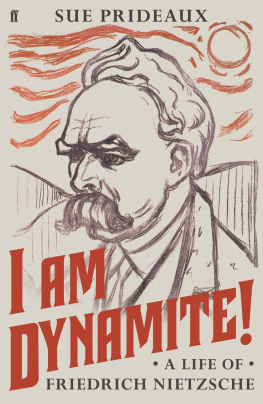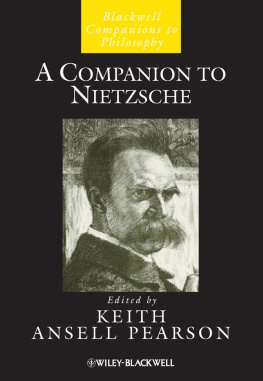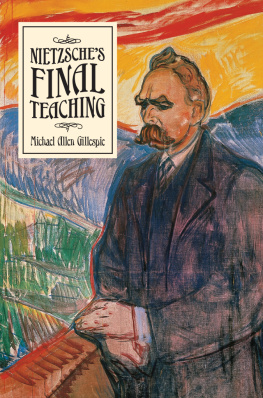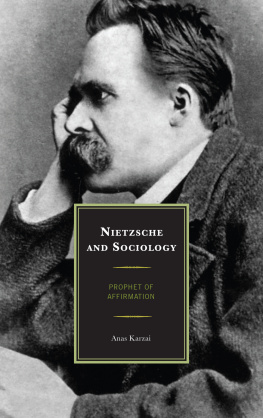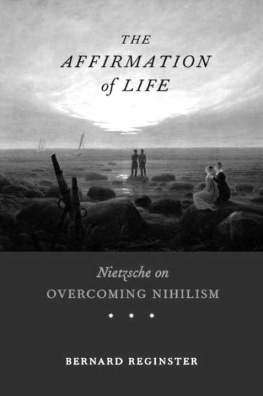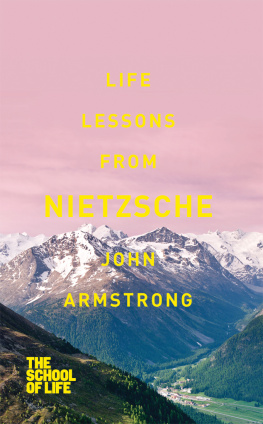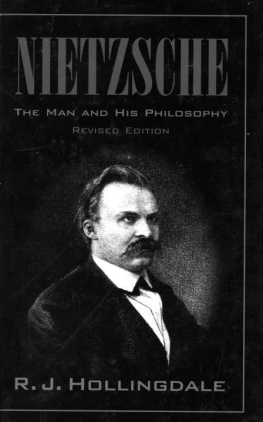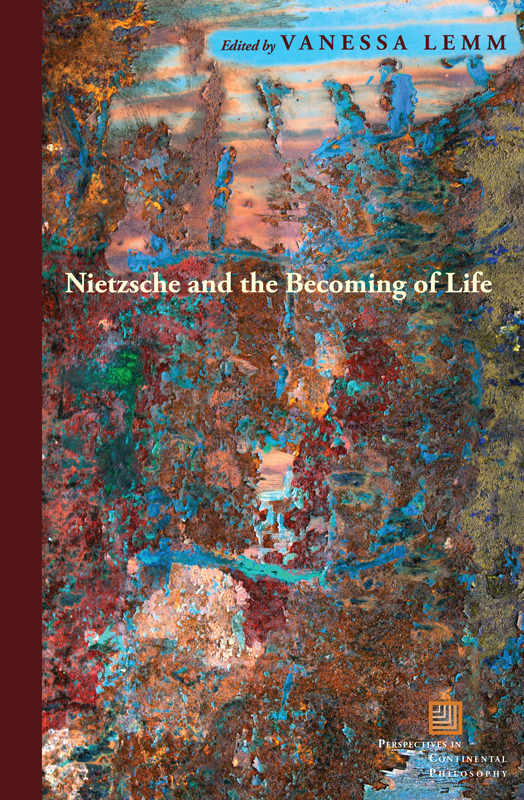Nietzsche and the Becoming of Life
Series Board
James Bernauer
Drucilla Cornell
Thomas R. Flynn
Kevin Hart
Richard Kearney
Jean-Luc Marion
Adriaan Peperzak
Thomas Sheehan
Hent de Vries
Merold Westphal
Michael Zimmerman
John D. Caputo, series editor


Copyright 2015 Fordham University Press
All rights reserved. No part of this publication may be reproduced, stored in a retrieval system, or transmitted in any form or by any meanselectronic, mechanical, photocopy, recording, or any otherexcept for brief quotations in printed reviews, without the prior permission of the publisher.
Fordham University Press has no responsibility for the persistence or accuracy of URLs for external or third-party Internet websites referred to in this publication and does not guarantee that any content on such websites is, or will remain, accurate or appropriate.
Fordham University Press also publishes its books in a variety of electronic formats. Some content that appears in print may not be available in electronic books.
Visit us online at www.fordhampress.com.
Library of Congress Cataloging-in-Publication Data
Nietzsche and the becoming of life / edited by Vanessa Lemm. First edition.
pages cm. (Perspectives in Continental philosophy)
Includes bibliographical references and index.
ISBN 978-0-8232-6286-1 (cloth : alk. paper) ISBN 978-0-8232-6287-8 (pbk. : alk. paper)
1. Nietzsche, Friedrich Wilhelm, 18441900. 2. Ontology. 3. Becoming (Philosophy) 4. Life. I. Lemm, Vanessa, editor.
B3318.O5N54 2015
193dc23
2014021938
Printed in the United States of America
17 16 15 5 4 3 2 1
First edition
Contents
Vanessa Lemm
Tracy B. Strong
Lawrence J. Hatab
Virginia Cano
Mariana A. Cruz
Herman W. Siemens
Vanessa Lemm
Scott Jenkins
Daniel Conway
Debra Bergoffen
Rainer J. Hanshe
Donovan Miyasaki
Mnica B. Cragnolini
Eduardo Nasser
Babette Babich
Dieter Thom
Keith Ansell-Pearson
Gary Shapiro
References to Nietzsches unpublished writings are standardized, whenever possible, to refer the most accessible edition of Nietzsches notebooks and publications, Nietzsche, Smtliche Werke: Kritische Studienausgabe , compiled under the general editorship of Giorgio Colli and Mazzino Montinari, are cited as KSA . References to the edition of the Nietzsche, Werke: Kritische Gesamtausgabe Werke, compiled under the general editorship of Giorgio Colli and Mazzino Montinari, are cited as KGW . References to the editions of letters, Nietzsche, Smtliche Briefe: Kritische Studienausgabe Briefe , compiled under the general editorship of Giorgio Colli and Mazzino Montinari, are cited as KSB . In the cases in which the KSA are cited, references provide the volume number followed by the relevant fragment number and any relevant aphorism (e.g., KSA 10:12[1].37 refers to volume 10, fragment 12[1], aphorism 37). In the cases in which the KSB is cited, references provide the number of the letter, followed by the volume and the page number (e.g. Letter Nr. 648, KSB 5:271). In the cases in which the KGW are cited, references provide the volume number followed by the section number followed by the fragment and in some cases the page number. The following abbreviations are used for citations of Nietzsches writings:
A | The Antichrist |
AOM | Assorted Opinions and Maxims ( HH , vol. II, part 1) |
BGE | Beyond Good and Evil |
BT | The Birth of Tragedy |
CW | The Case of Wagner |
D | Daybreak (alternately: Dawn ) |
DS | David Strauss, the Writer and the Confessor ( UM I) |
EH | Ecce Homo (sections abbreviated Wise, Clever, Books, Destiny; abbreviations for titles discussed in Books are indicated instead of Books where relevant) |
FEI | On the Future of Our Educational Institutions ( KSA 1) |
GM | On the Genealogy of Morals |
GMD | Greek Music Drama (Das Griechische Musikdrama, KSA 1) |
GS | The Gay Science |
GSt | The Greek State ( KSA 1) |
HC | Homers Contest (alternately: Homer on Competition) |
HH | Human, All Too Human (two volumes, I and II) |
HL | On the Use and Disadvantage of History for Life ( UM I) (alternately: Use and Misuse of History for Life; Vom Nutzen und Nachtheil der Historie fr das Leben ) |
KSA | Smtliche Schriften: Kritische Studienausgabe |
KSB | Smtliche Briefe: Kritische Studienausgabe Briefe |
KGW | Werke: Kritische Studienausgabe Werke |
NCW | Nietzsche contra Wagner |
P | The Philosopher. Reflections on the Struggle between Art and Knowledge |
PPP | The Pre-Platonic Philosophers (followed by section and page number) |
PT | Philosophy and Truth |
PTA | Philosophy in the Tragic Age of the Greeks ( KSA 1) |
PW | On the Pathos of Truth ( KSA 1) |
SE | Schopenhauer as Educator ( UM III) |
ST | Socrates und die Tragdie ( KSA 1) |
TI | Twilight of the Idols (sections abbreviated Maxims, Socrates, Reason, World, Morality, Errors, Improvers, Germans, Skirmishes, Ancients, Hammer) |
TL | On Truth and Lies in an Extra-Moral Sense ( KSA 1) |
TSK | Teleology Since Kant ( Die Teleologie seit Kant ) ( KGW I/4, NF 62[158], p. 548578) |
UM | Untimely Meditations (Volumes IIV) (alternately: Untimely Considerations ; Unmodern Observations ) |
WP | The Will to Power |
WS | The Wanderer and His Shadow ( HH , vol. II, part 2) |
Z | Thus Spoke Zarathustra (references to Z list the part number and the chapter title followed by the relevant section number when applicable) |
This collection of essays is in great part based on conference papers given at the International Conference Nietzsche and the Becoming of Life, which took place in November 2009 at the Institute of Humanities, Diego Portales University. I am grateful to the Diego Portales University, Chile, the Goethe-Institute Santiago, Chile, and the German Embassy, Santiago de Chile for their indispensable financial support without which the realization of this event would have been impossible. I thank all the contributors of this volume for their participation.
A draft translation from Spanish to English of the chapters by Virginia Cano, Mnica Cragnolini, and Mariana Cruz has been provided by Jennifer Croft. I thank Miguel Vatter, Matas Bascuan, and Benedict Storck for their help with the revision of the translations as well as the text by Eduardo Nasser. I also thank Nicols del Valle and Tabita Galleguillos for their support. Finally, I thank Michigan State University Press for their permission to reprint my article History, Life and Justice in Friedrich Nietzsches Vom Nutzen und Nachtheil der Historie fr das Leben 2011 Michigan State University. This article originally appeared in CR: The New Centennial Review Vol. 10, Iss. 3, 2011, pages 167188.


